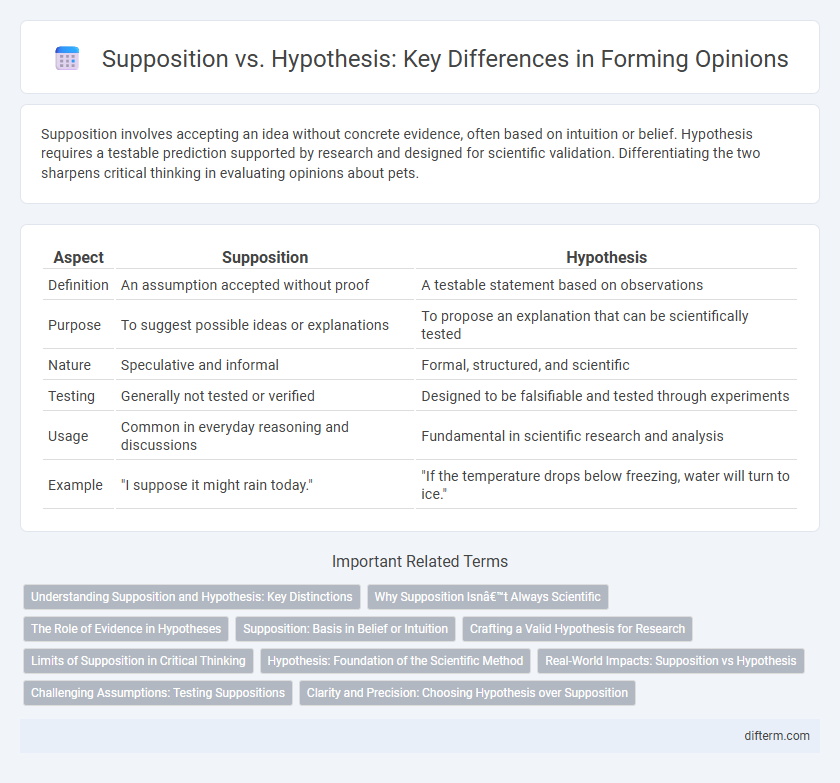Supposition involves accepting an idea without concrete evidence, often based on intuition or belief. Hypothesis requires a testable prediction supported by research and designed for scientific validation. Differentiating the two sharpens critical thinking in evaluating opinions about pets.
Table of Comparison
| Aspect | Supposition | Hypothesis |
|---|---|---|
| Definition | An assumption accepted without proof | A testable statement based on observations |
| Purpose | To suggest possible ideas or explanations | To propose an explanation that can be scientifically tested |
| Nature | Speculative and informal | Formal, structured, and scientific |
| Testing | Generally not tested or verified | Designed to be falsifiable and tested through experiments |
| Usage | Common in everyday reasoning and discussions | Fundamental in scientific research and analysis |
| Example | "I suppose it might rain today." | "If the temperature drops below freezing, water will turn to ice." |
Understanding Supposition and Hypothesis: Key Distinctions
Supposition involves assuming something is true for the sake of argument or investigation without requiring immediate proof, while a hypothesis is a testable prediction based on existing knowledge intended for scientific validation. Understanding this distinction clarifies that suppositions are broader and often informal assumptions, whereas hypotheses demand empirical evidence and structured experimentation. This key difference informs methodologies across disciplines, enhancing critical thinking and research design.
Why Supposition Isn’t Always Scientific
Supposition lacks the rigorous testing and empirical evidence that define scientific hypotheses, making it less reliable for scientific inquiry. Hypotheses are structured statements that can be falsified through experimentation, whereas suppositions often stem from assumptions without systematic validation. This fundamental difference renders suppositions unsuitable for advancing scientific knowledge effectively.
The Role of Evidence in Hypotheses
Evidence plays a crucial role in validating hypotheses by providing empirical support that distinguishes them from mere suppositions. Unlike suppositions, which are assumptions made without rigorous testing, hypotheses require systematic investigation and data collection to confirm or refute their claims. The scientific method relies on this evidential basis to foster reliable knowledge and advance understanding in disciplines ranging from biology to physics.
Supposition: Basis in Belief or Intuition
Supposition is primarily grounded in belief or intuition, serving as an initial assumption formed without rigorous evidence. It reflects a subjective perspective, often guiding early stages of reasoning or exploration. Unlike hypotheses, suppositions lack systematic testing and empirical validation.
Crafting a Valid Hypothesis for Research
Crafting a valid hypothesis for research requires formulating a clear, testable statement grounded in existing knowledge and empirical evidence. Unlike a mere supposition, a hypothesis must be specific, measurable, and capable of being confirmed or refuted through systematic experimentation or observation. Emphasizing operational definitions and defined variables strengthens the hypothesis's validity and guides the research methodology effectively.
Limits of Supposition in Critical Thinking
Supposition in critical thinking often limits analytical rigor by relying on unverified assumptions that lack empirical support. Unlike hypotheses, suppositions do not require testability or falsifiability, reducing their effectiveness in driving evidence-based conclusions. This limitation can hinder problem-solving and decision-making processes by promoting speculative reasoning rather than systematic inquiry.
Hypothesis: Foundation of the Scientific Method
A hypothesis serves as the foundation of the scientific method by providing a testable and falsifiable statement that guides experimental research. Unlike a mere supposition, a hypothesis requires empirical evidence and systematic investigation to validate or refute it. This rigorous process enables scientists to build reliable knowledge and advance scientific understanding.
Real-World Impacts: Supposition vs Hypothesis
Suppositions often serve as initial beliefs or assumptions lacking rigorous testing, which can lead to misconceptions influencing decision-making in real-world scenarios. Hypotheses, formulated through systematic observation and designed for empirical testing, provide a structured approach that advances scientific understanding and practical outcomes. The distinction between these concepts is crucial in fields like medicine and engineering, where validated hypotheses drive innovation and effective solutions, while unchecked suppositions risk errors and inefficiencies.
Challenging Assumptions: Testing Suppositions
Testing suppositions is crucial for challenging assumptions, as it involves critically examining preconceived ideas without presuming their validity. Unlike hypotheses, which are structured predictions requiring empirical testing, suppositions serve as initial guesses that must be scrutinized to uncover biases or errors. This practice fosters intellectual rigor by ensuring that foundational beliefs are not accepted uncritically but subjected to rigorous debate and evidence-based evaluation.
Clarity and Precision: Choosing Hypothesis over Supposition
Selecting hypothesis over supposition enhances clarity and precision in academic and scientific discourse by providing a testable and structured framework for investigation. Hypotheses are formulated based on existing knowledge and can be empirically verified or falsified, whereas suppositions often remain vague and untested assumptions. This distinction ensures more rigorous analysis and reliable conclusions in research contexts.
supposition vs hypothesis Infographic

 difterm.com
difterm.com